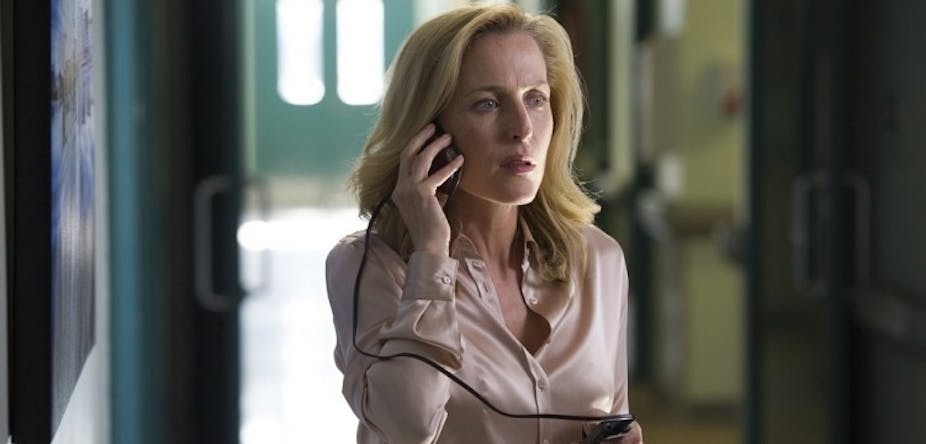Female characters are currently dominating our crime dramas on television worldwide, with shows such as British detective series Scott and Bailey, Danish cop show The Killing, Danish/ Swedish co-production The Bridge and now the acclaimed five-part British psychological thriller The Fall, currently screening on Foxtel. Does this represent a breakthrough for portrayals of women on the small screen, or are these essentially male roles played by female actors?
Women in crime drama
Gillian Anderson, best known for her performance as Scully in the long running US science-fiction drama The X Files stars in The Fall as Stella Gibson, the lead detective in pursuit of a serial murderer.
Some police shows with central female protagonists offer particular female pleasures: Scott and Bailey, for example, showcases the spectacle of female friendship, and US police procedural The Closer features fashion as much as crime, particularly large hand bags and elegant designer twin sets.
But more recent shows depict a new breed of female detective whose intense focus on their work and successful intuition is what distinguishes them from their colleagues.
In The Killing, detective Sarah Lund’s (Sofie Gråbøl) focus on work excludes other relationships. The cost is estrangement from her son and the loss of various actual and potential love interests along the way. In The Bridge, Saga Norén (Sofia Helin) plays a detective whose Aspergers gives her a unique insight into people and the job.
Like Sarah Lund and Saga Norén, The Fall’s Stella Gibson is intensely preoccupied with work, so much so that she sleeps on a camp bed in her office. But she does take time out to have sex, picking up a colleague she’s never spoken to before for a “sweet night” (sex with no strings attached). This behaviour profoundly unsettles the men around her.
Stella Gibson, Sarah Lund and Saga Norén all step outside of the bounds of traditional female or “feminine” behaviour – and this is significant in opening up possibilities for images of women on screen. Gibson and Norén shock colleagues by having sex like men, and by being matter of fact about satisfying their sexual desires.
Gender switch
Gibson’s character is “stellar” like her name – but is her role a breakthrough in female representation on screen or just a gender switch? Does it tell audiences anything about female existence, or merely privilege male ways of doing and being? In other words, is she just a male character in women’s clothing?
The Stella Gibson character is arguably interchangeable with a male detective such as DI Alec Hardy (David Tennant) in the UK drama Broadchurch, which recently screened on the ABC. They have the same work ethic and mono-focus on the job.
In terms of how men and women are ordinarily depicted, Gillian Anderson’s character is more “like” a man. The message is that to be successful one has to be almost completely consumed by work.
Stella Gibson, Sarah Lund and Saga Norén are not women who have it all, they just have work — despite the allure they have for the men around them, whom they variously devour. There is danger for women in this message. It implies that success requires a choice, a life with personal relationships or a successful career. The latter is depicted as leaving the woman alone, hardened and driven.
The F-word
Following this line of thinking, does this type of role offer audiences any female – or feminist – perspectives?
This series has men in all the key creative production roles, giving it a low ranking on the equity scale. However Allan Cubitt created it. He’s the writer behind British crime drama Prime Suspect 2, which stars Helen Mirren, He has a track record shaping interesting and active women characters – so The Fall gets a tick for that.
But it is Stella Gibson’s speeches that offer a clearer example of feminist perspectives informing contemporary television.
As the series progresses Gibson makes a number of observations that show how gender stereotyping affects women. If those speeches seem a bit self-conscious, they also make this important issue visible. In drafting a press release, Gibson observes that the media categorise women as “virgins and vamps, angels and whores”. She remarks, “let’s not encourage them”.
Female experience on screen
The difficulties of being a woman in an all-male environment get some airplay too.
There are plenty of hints that the men in the team might easily be moved to line up against Gibson. It is no surprise when she says she needs a “right hand man” – and picks a woman.
Gibson might wear the pants but satin shirts emphasise her femininity and sex appeal. The camera spends plenty of time gazing at her. The problem of what to wear to work, and how women might be read based on that, is a particularly female one.
Men don’t have “wardrobe malfunctions” in a press conference, in which wayward buttons reveal glimpses of lingerie. In this way, the show explores what it’s like for a woman to feel her gender in a body constantly remarked upon.
The show makes important gestures towards making gender stereotyping visible. It is significant that men have created a series that promotes some feminist agendas – and indeed that mainstream TV can be feminist.
Gibson portrays a woman whose intellect, integrity and work ethic makes her a force to be reckoned with. But I am left with a vague feeling that this series and character, as with The Killing and Sarah Lund, contains a warning to women about what they might lose when they throw themselves into work. The show carries an implicit message that women really shouldn’t be like Stella Gibson.
On balance there are many positives in the character of Stella Gibson, including that she is capable, interesting and importantly “active”. Let’s hope it encourages media producers to be more adventurous in the female roles they dream up.

